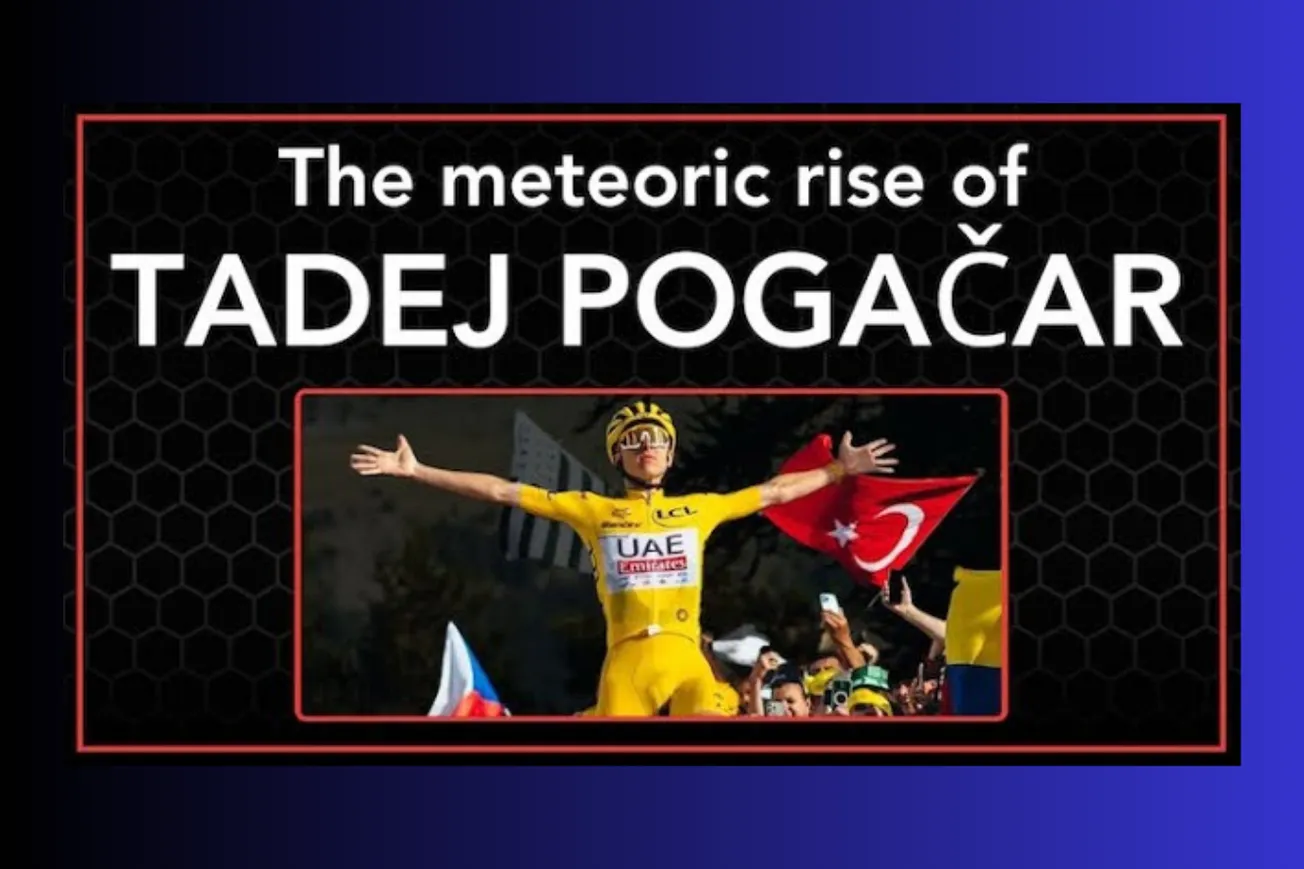Table of Contents
The Slovenian cycling phenomenon opens up about his breakthrough 2020 Tour de France victory, rigorous training methods, and rivalry with Jonas Vingegaard in this revealing interview.
Key Takeaways
- Pogačar's 2020 Tour de France victory was unexpected, initially targeting just a podium finish before the final time trial changed everything
- His training emphasizes 320-340 watts for five hours in zone 2, demonstrating remarkable aerobic capacity
- Heat training and core strengthening became crucial additions to his regimen between 2023 and 2024
- Nutrition evolution from eating "cake on cake" as a junior to consuming 120 grams of carbohydrates per hour during hard stages
- His rivalry with Jonas Vingegaard pushes both cyclists to new heights, with the Tour de France serving as their annual test
- Weight management requires more attention now at 26, maintaining 65kg during racing season and maximum 69kg in offseason
- VAM (Vertical Ascent Meters) of 1,700-1,800 for 15 minutes on 7-8% gradients showcases his climbing prowess
- Heart rate variability tracking helps monitor recovery, ranging from 35 on bad days to 150 on exceptional days
- Team sport mentality drives his gracious attitude in defeat, acknowledging teammates' sacrifices throughout Grand Tours
The Unlikely Champion's Breakthrough Moment
The 2020 Tour de France transformed Tadej Pogačar from promising prospect to cycling legend overnight. Going into that pivotal race, expectations remained modest. "I was not expecting at all to win in 2020," Pogačar recalls, explaining how the COVID-shortened season left little opportunity to prove form. His UAE Team Emirates squad brought two leaders - himself and Fabio Aru - with no clear hierarchy established.
- The breakthrough came on the stage to Alpe d'Huez when Pogačar finished just 15 seconds behind Primož Roglič, suddenly realizing a podium position was within reach and they were already preparing a white bike for the next day's ceremony
- His final time trial performance remains legendary, producing 380-390 watts on the flat sections while weighing just 66 kilograms, a power-to-weight ratio that demolished the competition
- The climb portion of that time trial saw him abandon his power meter to achieve the UCI's 6.8-kilogram minimum bike weight, relying purely on feel and local knowledge from extensive reconnaissance with teammates
- Team preparation proved crucial, with multiple reconnaissance rides on the course providing intimate familiarity that translated into confidence when the pressure mounted highest
- The victory stunned even Pogačar himself, admitting "I think still a lot of people don't believe it happened" when reflecting on that career-defining moment that announced his arrival at cycling's summit
Training Philosophy and Power Metrics
Pogačar's training approach centers on understanding his body's responses across multiple metrics rather than relying solely on technology. His zone 2 training reveals extraordinary aerobic capacity, maintaining 320-340 watts for five-hour sessions while keeping lactate levels below two millimoles and heart rate around 140-155 beats per minute. This combination represents elite-level efficiency that few cyclists can match.
- Heart rate monitoring has guided his training since age 10, providing deep understanding of how his cardiovascular system responds under various conditions of fatigue and freshness
- Power meter reliability concerns lead him to emphasize multiple data points, including speed and VAM (Vertical Ascent Meters) on familiar home roads where he can gauge true performance
- Monaco's challenging terrain limits sustained zone 2 work due to constant elevation changes, forcing adaptation to 20-40 minute climbing intervals followed by recovery on descents
- When training on flatter terrain in Slovenia or Spain, he targets true zone 2 for five continuous hours, though this intensity requires complete rest the following day
- His VAM numbers on 7-8% gradients reach 1,700-1,800 meters per hour for 15-minute efforts, demonstrating climbing power that places him among cycling's absolute elite
The Slovenian champion's relationship with technology remains pragmatic rather than obsessive. While he tracks heart rate variability and resting metrics, Pogačar acknowledges these numbers can be misleading. His girlfriend employs a clever strategy during races, checking HRV data only after competitions to avoid psychological interference with performance.
Nutritional Evolution and Physical Development
The transformation from junior cyclist who could "eat cake on cake" to professional requiring precise nutritional timing illustrates Pogačar's maturation as an athlete. His approach to fueling has become increasingly sophisticated, particularly regarding carbohydrate intake during racing and weight management throughout the season.
- Current race nutrition targets 120 grams of carbohydrates per hour during hard stages, achieved through carefully formulated gels and drinks containing optimal glucose-fructose ratios designed by his team's nutritionist
- Bottles contain either 30 or 60 grams of carbohydrates depending on stage difficulty, with higher concentrations used when eating solid food becomes challenging during intense efforts
- Five years ago, consuming 120 grams per hour would cause severe digestive distress, but gradual adaptation and improved product formulation eliminated stomach problems entirely
- Weight management now requires attention at age 26, maintaining 64.5-65.5 kilograms during Grand Tours compared to 66 kilograms in his breakthrough 2020 season
- Offseason weight peaks around 69 kilograms maximum, with sustainable year-round eating habits that avoid restrictive dieting or complete elimination of treats like chocolate and cake
His relationship with food emphasizes balance over restriction. Pogačar believes complete denial of enjoyable foods leads to eventual binges, preferring moderation that maintains healthy psychological associations with eating while meeting professional demands.
The Art and Science of Climbing
Different climb profiles demand varying tactical approaches, with Pogačar's preferences revealing insights into modern Grand Tour racing dynamics. His analysis of iconic Tour de France ascents demonstrates deep understanding of how gradient, length, and environmental factors affect racing outcomes.
- Steep climbs above 9% eliminate drafting advantages, allowing pure power-to-weight ratios to determine outcomes and enabling tactical freedom unavailable on more gradual ascents
- Preferred climbing duration centers around 20-minute efforts at 10-12% gradients, though training near his Monaco base limits access to such sustained steep climbs
- Heat adaptation training has become increasingly important, using indoor trainers to deliberately overheat the body and improve performance in challenging weather conditions
- Among legendary Tour climbs, he ranks Ventoux as hardest due to wind exposure and heat, followed by Alpe d'Huez, with Galibier considered easiest of the three despite its high altitude
- Stage 17 to Col de la Loze in 2023 represents the most brutal modern Tour climb in his experience, requiring recovery from both the ascent itself and the preceding technical descent
Training for climbing variety requires careful simulation of race conditions. Pogačar studies upcoming stage profiles and replicates the number and intensity of key climbs during training, understanding that muscular endurance for repeated efforts often proves more decisive than single maximal powers.
Mental Resilience and Team Dynamics
Pogačar's gracious behavior in defeat stems from deep understanding of cycling as a team sport despite individual glory. His response to setbacks, particularly after difficult stages where team support becomes visible, demonstrates emotional intelligence that sets him apart from many elite competitors.
- Recognition that teammates sacrifice everything to support one rider's Grand Tour ambitions creates profound sense of responsibility and gratitude that influences his public behavior
- After devastating defeats like stage 16 at Col du Granon in 2022, his immediate instinct focuses on thanking teammates rather than expressing personal frustration
- Team dinners following difficult days provide emotional support that helps process disappointment and maintain perspective on temporary setbacks within longer careers
- The frustration after finishing second in 2022 and 2023 Tours created anxiety and stress that required careful evaluation of mistakes and rebuilding confidence through subsequent victories
- Winning Tour de Lombardi in 2023 served as crucial psychological healing, proving his ability to respond to Grand Tour disappointments with victories in cycling's most prestigious one-day races
This team-first mentality extends beyond public relations to genuine understanding of collective effort required for Grand Tour success. Pogačar's acknowledgment of feeling he "let them down" during defeats reveals the emotional weight of leadership in professional cycling's most demanding events.
Rivalry and Future Aspirations
The developing rivalry with Jonas Vingegaard represents cycling's most compelling current narrative, with both riders pushing each other to new performance levels. Pogačar views this competition as beneficial, creating annual Tests that determine superiority while advancing the sport's overall standard.
- Vingegaard's 2023 crash affected his preparation more than immediate power numbers, limiting three-week racing capacity despite maintaining impressive shorter-duration outputs
- The Tour de France serves as their definitive annual comparison, with other races providing preparation and context but lacking the comprehensive test of a three-week Grand Tour
- Pogačar's intention to continue racing Tours depends entirely on enjoyment levels, planning to retire from Grand Tour competition when stress outweighs satisfaction
- Goals extend beyond Grand Tours to include World Championships, the remaining Monument classics (Paris-Roubaix and Milan-San Remo), and completion of the Vuelta a España victory
- Olympic ambitions remain conditional on course design, with preference for climbing-heavy parcours similar to Tokyo rather than flatter profiles that favor different rider types
His approach to legacy remains grounded in present performance rather than historical comparisons. While acknowledging Eddy Merckx's unprecedented palmares, Pogačar focuses on race-by-race excellence rather than attempting to match achievements from cycling's fundamentally different era.
The Slovenian champion's remarkable combination of physical gifts, strategic intelligence, and emotional maturity positions him perfectly for continued dominance. His willingness to evolve training methods, nutrition strategies, and tactical approaches while maintaining the joy that drives elite performance suggests many more years of cycling excellence ahead. Whether battling Vingegaard, pursuing Monument victories, or simply enjoying the sensation of racing through screaming fans on mountain climbs, Pogačar embodies cycling's bright future while respecting its storied past.





